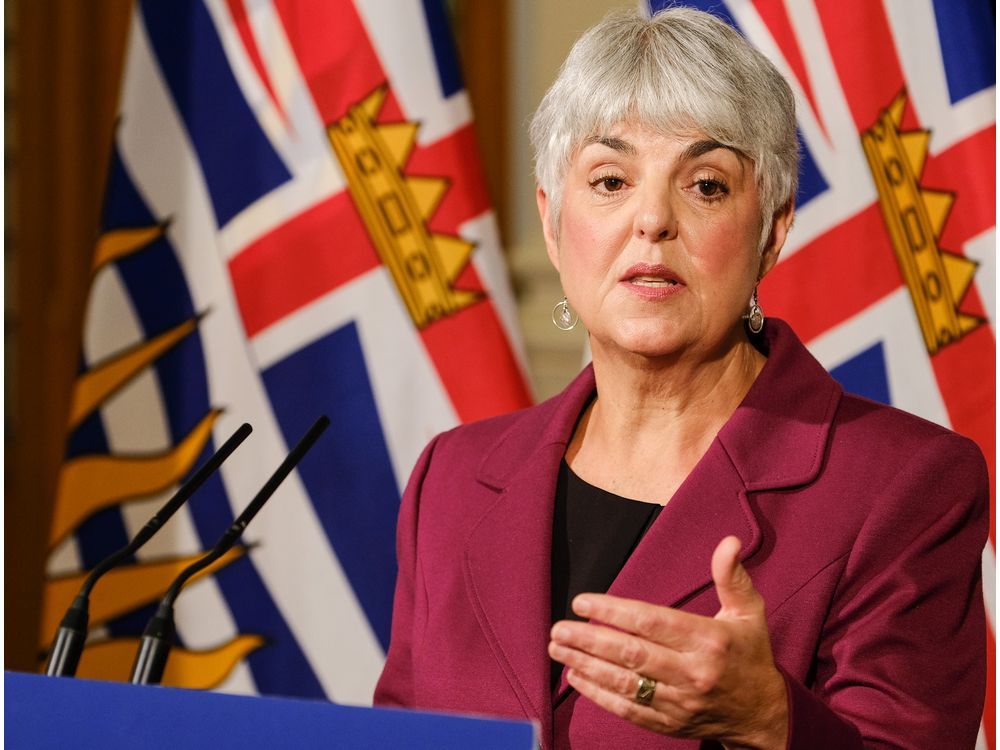Vaughn Palmer: James banking on balancing budget despite rash of negative indicators

Credit to Author: Gord Kurenoff| Date: Wed, 27 Nov 2019 02:28:01 +0000
VICTORIA — New Democrats will remain on track for a balanced budget despite mounting challenges, Finance Minister Carole James insisted Tuesday.
She based her forecast on positive numbers on economic growth, employment, housing starts and other indicators.
Plus there’s an untapped $1 billion tucked under the couch cushions in contingency funds and a forecast allowance.
Still, the finance minister didn’t skimp on the negatives in releasing the latest update on provincial finances.
Exports are on the slide, retail sales flat. Revenue from property sales down again. All by itself, the troubled forest sector provided a whole mess of negative indicators.
Direct revenues to government from the timber harvest were down by more than $100 million over the first half of the year. There has been a 25 per cent drop in manufactured wood shipments. The timber harvest, running 20 per cent below forecast, is expected to bottom out at 46 million cubic metres for the year.
The last time the harvest slumped to that level was almost 40 years ago, in the depths of the early 1980s recession.
There may be more bad news to come from the forest sector in terms of impact on provincial revenues. The finance ministry is recording a jump in corporate income taxes based on last year’s assessments.
But those returns could be reversed as this year’s mill closures and production cuts translate into hits on corporate as well as personal income taxes. The loss of so many paycheques in forest industry-dependent towns will have an impact on local merchants as well.
The other thing plaguing James is ICBC: “I am frustrated with ICBC all around because of the mess we were left with.”
The B.C. Liberals did indeed leave behind a mess at ICBC when they blundered out of office. They also left behind a $2.7 billion operating surplus and some of the best economic and fiscal indicators in the country, which continue to flatter the current government as well.
On the struggle with ICBC, James started the year by projecting that, after dropping $2 billion in 2017 and 2018, the auto insurance company would lose a mere $50 million.
Make that $91 million according to Tuesday’s update. Nor does that projection include the financial impact of ICBC’s recent court loss over the failed effort to cap the use of medical and other experts in auto insurance cases.
James had earlier accepted the estimate from attorney general David Eby, cabinet minister for ICBC, that the cap would save $400 million.
She’s not yet booking that amount as a loss because ICBC is working on a fallback plan to recover some of the $400 million.
“I don’t want to prejudge,” said James when asked how that was possible after Eby abandoned an appeal of the court judgment with only a few months left in the fiscal year.
“ICBC is looking at options to be able to mitigate the court decision,” said the finance minister. “So until we take a look at what savings they may project, we won’t be able to account for how much that’s going to take out of the budget.”
The waiting game notwithstanding, James has a fall back position of her own. In the “worst case scenario,” she may have to cover ICBC’s entire loss from that $1 billion in contingencies and the forecast allowances.
“That’s what those funds are there for,” she said, which is true enough. But there will be other pressures on the budget as well.
Starting in September finance directed all ministries to curb $300 million in discretionary spending in order to generate enough savings to cover other pressures.
“It’s early going yet,” James told reporters. “But I have been very pleased with the work that ministries have done.”
Near the end of the press conference, James was asked about the pressure campaign by the B.C. Teachers’ Federation to persuade the government to put more money on the table in current contract negotiations.
“The mandate is the mandate,” replied James, referring to the bargaining mandate for new contracts with more than 300,000 unionized public sector workers. About 70 per cent have already come to terms, she added.
“I certainly understand advocacy for more funds to public education and the impatience of fixing a lot of years of challenges,” continued the cabinet minister and former school trustee. “But at the bargaining table, the mandate is the mandate.”
Translation: no more money.
Another key answer came when she was asked about the struggle to maintain the razor-thin surplus, currently projected to be about $150 million. Why go to all that trouble when a deficit of similar size would barely constitute a rounding error on a budget of $58 billion.
“From my perspective, that’s the job,” she replied. “To make sure you are spending within your means, that you’re balancing the budget.”
But never say never: “I don’t think there’s a finance minister who would stand up in front of you and say there will never be a deficit. If we see a global crisis economically, we may have to take a look at redoing our budget.”
The Social Credit government went into deficit in the 1980s recession. As did the B.C. Liberals when the global credit crunch hit in 2008.
As I read James it would take that kind of crisis, not the current scale of economic troubles, before the New Democrats would venture into red ink.
CLICK HERE to report a typo.
Is there more to this story? We’d like to hear from you about this or any other stories you think we should know about. Email vantips@postmedia.com